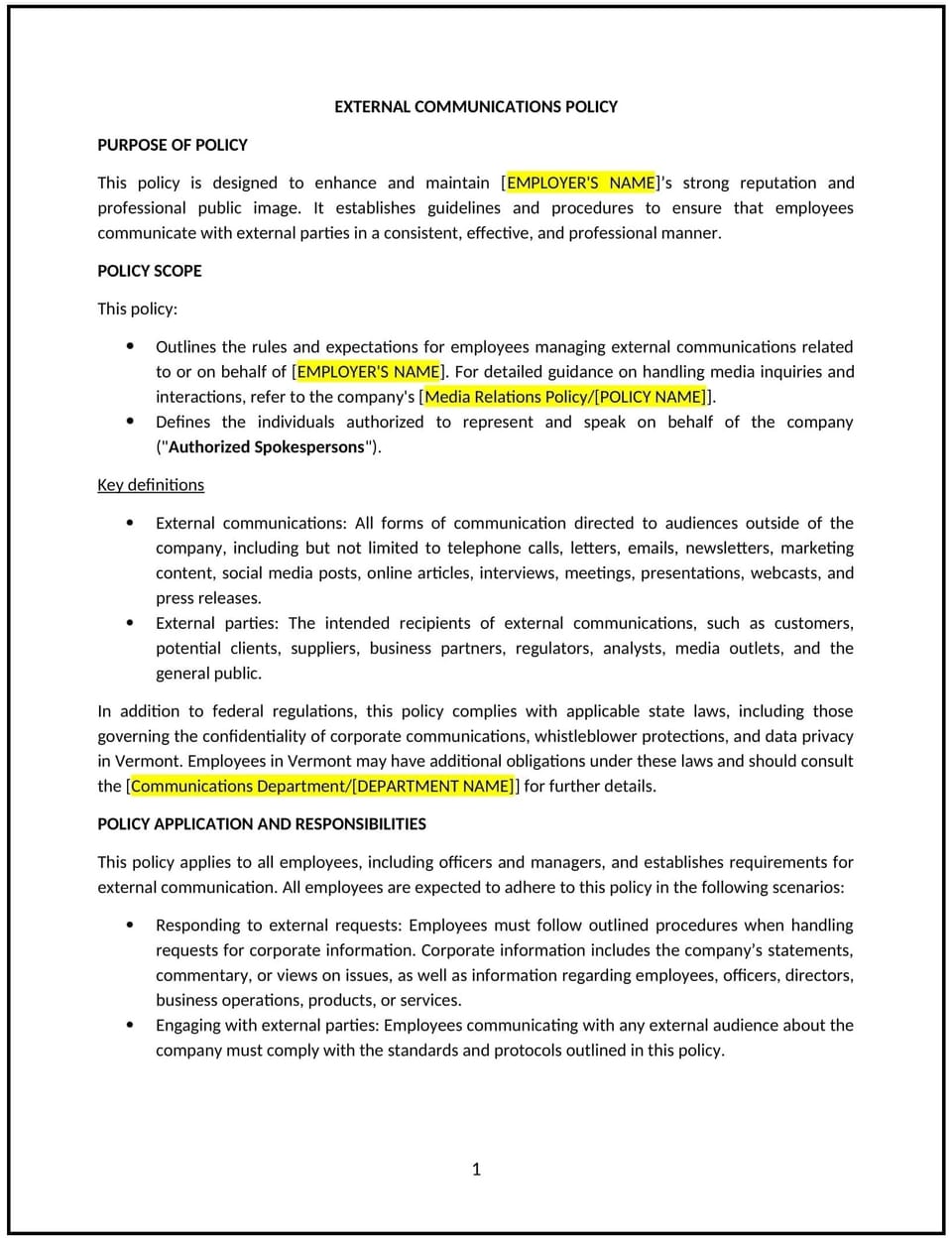External communications policy (Vermont): Free template

External communications policy (Vermont)
This external communications policy is designed to help Vermont businesses manage how information is shared with outside parties, such as media, customers, vendors, and other stakeholders. It establishes guidelines for maintaining a consistent, professional image while maintaining compliance with Vermont laws and protecting confidential information.
By adopting this policy, businesses can safeguard their reputation, minimize risks, and promote effective communication.
How to use this external communications policy (Vermont)
- Define authorized spokespeople: Specify which employees are permitted to represent the company in external communications, such as senior executives or designated PR personnel.
- Include media interaction guidelines: Outline procedures for responding to media inquiries, including approvals and designated contacts.
- Address social media use: Provide rules for employees posting about the company on personal or official social media accounts.
- Protect confidential information: Emphasize that employees must not disclose proprietary or sensitive information in any external communication.
- Establish approval processes: Require review and approval for public-facing materials, such as press releases, marketing content, or official statements.
- Include crisis communication protocols: Provide guidance for managing external communications during emergencies or controversies.
- Monitor compliance: Regularly review practices to ensure alignment with Vermont laws and company objectives.
Benefits of using this external communications policy (Vermont)
This policy provides several benefits for Vermont businesses:
- Protects reputation: Ensures consistent and professional messaging to external audiences.
- Reduces risks: Minimizes the potential for misinformation, confidentiality breaches, or unauthorized disclosures.
- Enhances compliance: Aligns with Vermont laws governing business communications and data protection.
- Promotes accountability: Clarifies roles and responsibilities for employees handling external communications.
- Supports crisis management: Provides a structured approach for managing communications during emergencies.
Tips for using this external communications policy (Vermont)
- Communicate the policy: Share the policy with all employees and include it in the employee handbook or internal resources.
- Provide training: Offer regular training on media relations, social media guidelines, and confidentiality requirements.
- Monitor social media activity: Ensure employee posts align with company values and avoid potential conflicts.
- Designate contacts: Clearly identify the employees responsible for handling media and public inquiries.
- Update regularly: Revise the policy to reflect changes in Vermont laws, company practices, or communication technologies.
Q: Who is authorized to speak on behalf of the company?
A: Only designated spokespeople, such as senior executives or PR personnel, are authorized to represent the company in external communications.
Q: How should employees handle media inquiries?
A: Employees should refer all media inquiries to the designated spokesperson or PR team, as outlined in this policy.
Q: Are employees allowed to post about the company on social media?
A: Employees may post about the company on personal social media accounts, provided they follow the guidelines in this policy and do not disclose confidential information.
Q: What happens if an employee shares confidential information externally?
A: Unauthorized disclosures of confidential information may result in disciplinary action, including termination, depending on the severity of the breach.
Q: How are communications managed during a crisis?
A: Crisis communication protocols include appointing a spokesperson, preparing approved statements, and coordinating with the leadership team to ensure consistent messaging.
Q: How are public-facing materials approved?
A: All public-facing materials, such as press releases or marketing content, must be reviewed and approved by the designated team or individual before distribution.
Q: How often is this policy reviewed?
A: This policy is reviewed annually or whenever significant changes occur in Vermont laws, business practices, or communication needs.
Q: Does this policy apply to contractors or third parties?
A: Yes, contractors and third parties working with the company must adhere to the principles outlined in this policy when communicating on behalf of the company.
This article contains general legal information and does not contain legal advice. Cobrief is not a law firm or a substitute for an attorney or law firm. The law is complex and changes often. For legal advice, please ask a lawyer.


